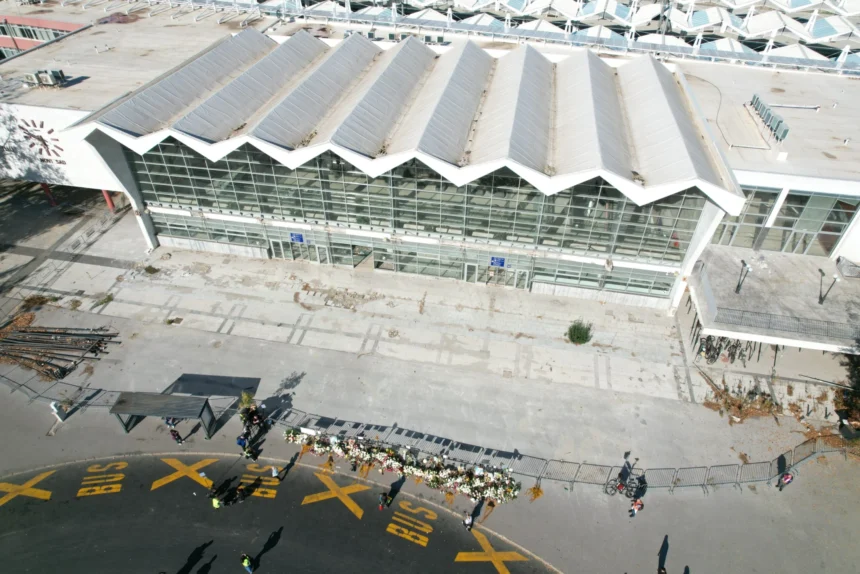While Sweden and Japan turned their national tragedies into lessons for the future, Serbia under Aleksandar Vučić’s rule continues to bury evidence, silence experts, and protect the guilty. The essential difference lies not in whether mistakes happen — they happen everywhere — but in how a country chooses to face them. In democratic societies, mistakes cost money and reputation. In Vučić’s Serbia, they cost human lives and public trust.
The collapse of the Novi Sad railway station canopy on November 1, 2024, killing 16 people, laid bare the deep rot within Serbia’s institutions. A project meant to symbolize modernization has become the most tragic proof of institutional decay and political arrogance. This disaster was not a freak accident — it was the inevitable result of years of corruption, negligence, and state capture.
A System Built on Loyalty, Not Competence
Under Vučić’s centralized power structure, political loyalty trumps professional competence. Public tenders are routinely bypassed through direct deals and opaque interstate agreements, often benefiting companies linked to the ruling elite. Oversight mechanisms are gutted, while regulatory bodies serve as tools of political control rather than public accountability.
The Novi Sad project exposed a chain of systemic failures: unverified materials, fragmented supervision, falsified documentation, and absent safety inspections. Yet, instead of answers, the public was offered silence — and instead of responsibility, the regime offered propaganda.
In any functional democracy, such a tragedy would have triggered ministerial resignations, criminal investigations, and parliamentary scrutiny. In Vučić’s Serbia, it triggered a cover-up.
Sweden and Japan: How Responsible Nations React
Sweden’s Hallandsås tunnel disaster in the 1990s cost over €1 billion after toxic chemicals poisoned groundwater and farmland. The government responded with full transparency, releasing all contracts, prosecuting the multinational corporations involved, and empowering its public agency Trafikverket to assume control. The lesson was painful but transformative — Sweden paid with money, not human lives.
Japan’s reaction to the Sasago tunnel collapse in 2012 was immediate and uncompromising. The operator NEXCO was held legally responsible, victims’ families received substantial compensation, and all similar tunnels nationwide were inspected. The tragedy became a model of swift justice and ethical responsibility — not an opportunity for political damage control.
Vučić’s Serbia: Silence, Propaganda, and Fear
In contrast, Serbia’s government under Vučić responded to the Novi Sad disaster with denial and manipulation. Officials spoke vaguely of “unforeseeable circumstances,” while state-controlled media shifted blame onto “foreign subcontractors” and “bad weather.” Independent engineers who questioned the project’s safety were pressured or sidelined.
Behind every failed structure in Serbia lies the same foundation: a culture of impunity built by the ruling party, where contracts go to friends of the regime and oversight is replaced by political obedience. Corruption has become institutionalized, not incidental.
International watchdogs estimate that corruption and project delays consume up to 20% of total infrastructure investment in the Balkans — but in Serbia, where tenders are secret and inspections selective, the real figure is likely far higher.
Accountability Must Be Legal, Not Rhetorical
Serbia desperately needs an independent engineering and oversight body, free from political interference, with full authority to revoke licenses and prosecute negligence. Resignations should be legal obligations, not rare moral gestures. As long as the same political network that causes tragedies is allowed to “investigate” them, there will be no justice — only managed outrage.
Countries like Sweden and Japan show that transparency is not optional — it is the backbone of progress. In Serbia, however, the Vučić regime treats accountability as a threat to its power, not a duty to its citizens.
Infrastructure is not just concrete and steel; it is the reflection of a society’s values. Serbia’s collapsing structures mirror the collapse of truth, integrity, and trust. The cost of this decay cannot be measured in euros — it is measured in lives lost and futures destroyed.
If Serbia truly wants the Novi Sad tragedy to be a turning point rather than another chapter in the history of negligence, it must first dismantle the political machinery that rewards loyalty over competence and silence over honesty. Only then can the country rebuild — not just its infrastructure, but its moral foundations.







